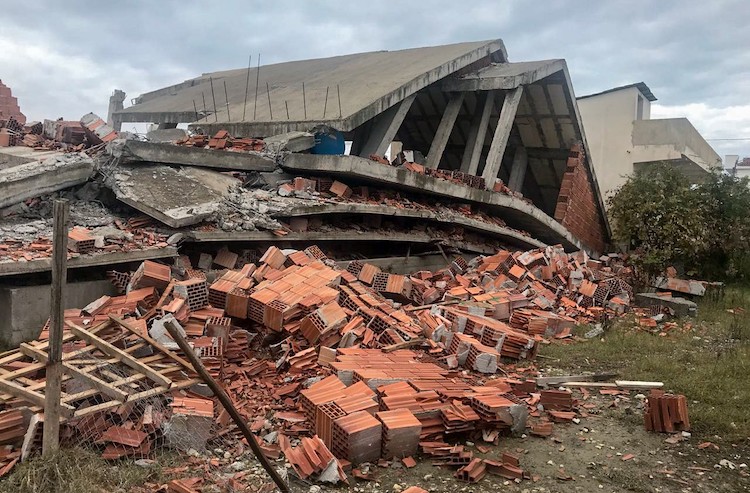TIRANA (IDN-INPS) – A mother of three was found under the rubble hugging her three children. A 24-year-old student’s dream of becoming a dermatologist was cut short.
A family of eight was found under their collapsed four-storey concrete home. The youngest was two. There was only one survivor from that family — a 17- year-old boy, frozen with shock and unable to utter a word.
A 33-year-old had promised her husband, who passed away two years ago, that their daughter would follow his footsteps and become a painter; they both died.
A little boy asked a journalist: “Can you please take a photo of me? I have none left.”
This is how the morning of the 26th of November found Albania after the 6.4 magnitude earthquake struck, killing 51 people.
More than a thousand aftershocks, some with a magnitude of more than 5.0, further damaged buildings and terrified residents. People lost their loved ones, their homes, their memories.
In the face of this situation, a national and international network of solidarity was activated to provide aid and relief. UNDP has deployed a team of six international advisers for the post-disaster emergency response and early recovery efforts.
In partnership with the government, including the Emergency Committee, the Ministry of Economy and Finance, and the EU Civil Protection Unit, UNDP applied the Household and Building Damage Assessment methodology.
It has been successfully tested in other countries to help authorities assess the damage to infrastructure and buildings and collect geo-referenced information. The data gathered will help plan for emergency relief and recovery.
The methodology was tested in the field with Albanian government authorities and UNDP. The government adapted it to their needs, and national institutions and engineers are undertaking building damage assessment in seven municipalities.
“We are happy we could mobilize international expertise immediately through our global networks. This is one of the roles of UNDP to connect knowledge and digital solutions from one continent to another,” said UNDP Resident Representative in Albania Limya Eltayeb.
The earthquake affected thousands of lives and livelihoods, sweeping away what took citizens years to build, trapping them in deeper vulnerability and exacerbating existing poverty. The winter found some in hotels but also living in tents and with relatives. Elderly, children, and those living with disabilities were finding it particularly hard to cope.
“It has taken us 15 years to build this house bit by bit. We no longer have it and will never be able to rebuild it,” said Anila, 32, who lives in a tent outside her damaged house with her husband and mother-in-law who has a health conditions and needs kidney dialysis three times a week.
Drita, 10, from Ishem Durres says she is still shaken by the tremors that keep recurring over and over again.
In partnership with the Ministry of Economy and Finance, UNDP mobilized its staff and volunteers in addition to ministry staff who are travelling to remote locations, to assess the situation using its Household Damage Assessment tool. The tool generates useful data for the government and international development partners as they prioritize assistance.
UNDP signed an agreement with the Albanian National Institute of Statistics to run a mini Income and Living Conditions Survey to asses living conditions which will be useful for the government’s rapid decisions for priority assistance and the recovery plan that follows.
In the aftermath of this disaster, the Government of Albania needs to quickly assess damaged buildings and ensure citizens return to their homes, kick start the Post Disaster Needs Assessment (PDNA) and develop a recovery framework. The PDNA estimates damages and losses and is the foundation to a holistic recovery programme that promotes equity and inclusion.
The PDNA is a government-led process supported by the European Union, the World Bank and the United Nations in Albania. As part of the UN family, UNDP is leading the work in community infrastructure; tourism, employment and culture; and co-leading work with the EU in the areas of Disaster Risk Reduction and Civil Protection and Social Protection.
Amid death and debris, people are still suffering from shock and psychological trauma. But there is also a wave of solidarity and support from people, neighbouring countries and international organizations. There is hope. [IDN-InDepthNews – 08 January 2020]
Photo: A 6.4 magnitude earthquake struck Albania the morning of 26 November 2019, killing 51 people. Credit: UNDP
IDN is flagship agency of the International Press Syndicate.
facebook.com/IDN.GoingDeeper – twitter.com/InDepthNews

